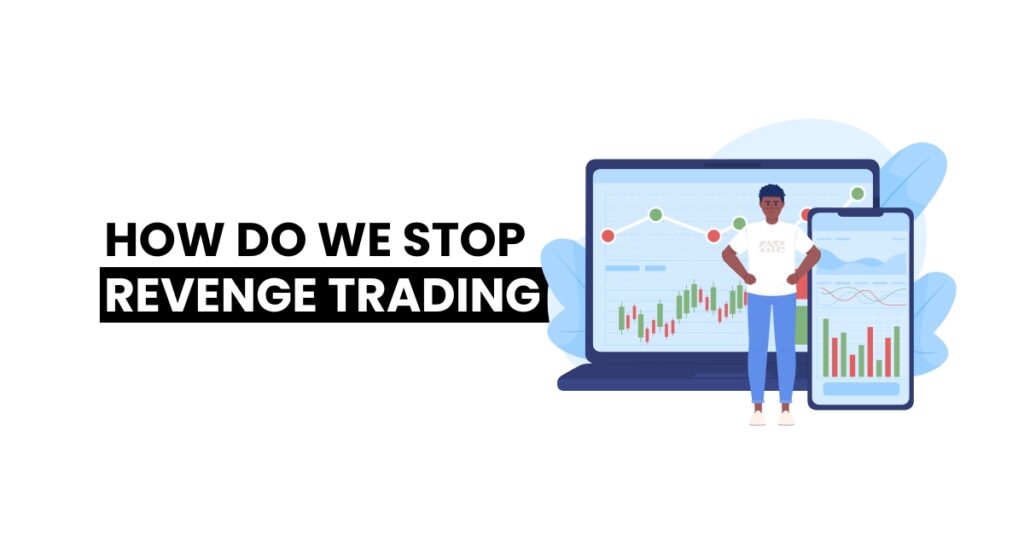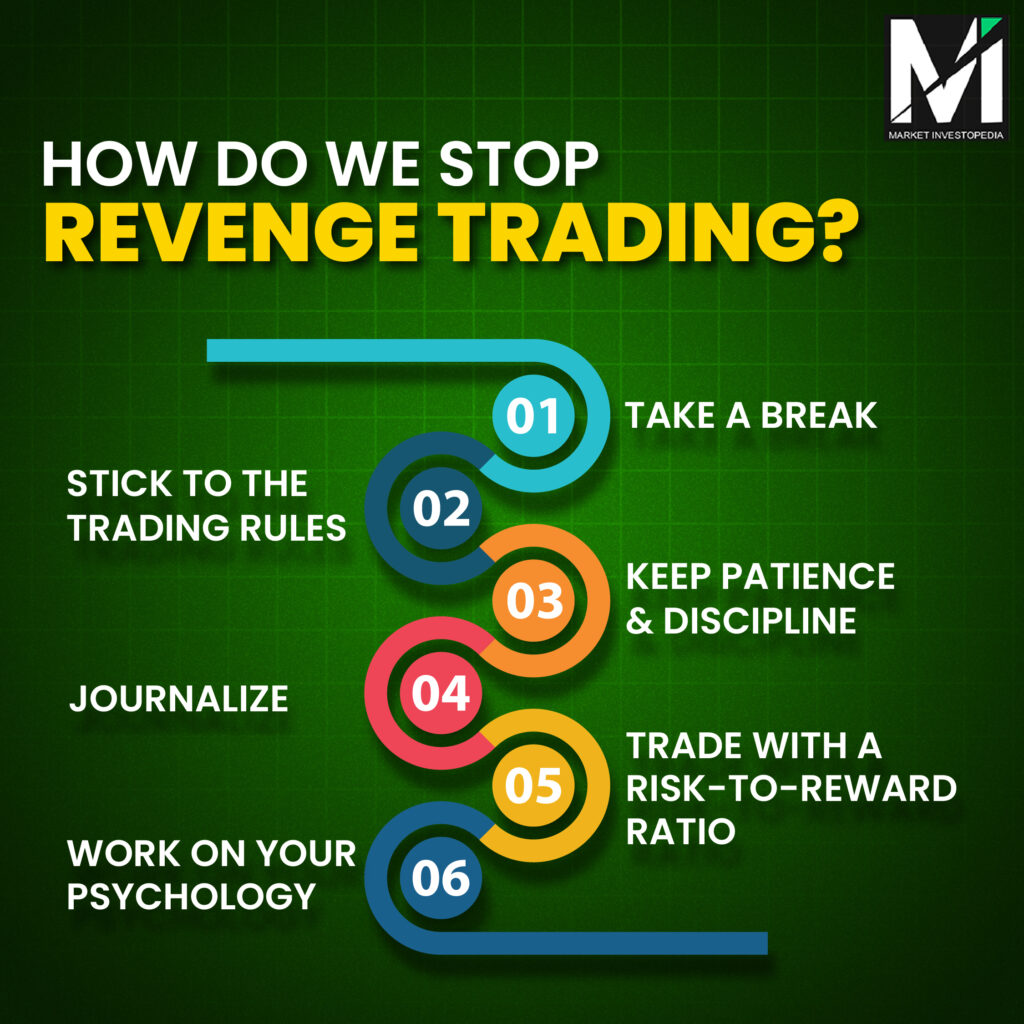Are you practising revenge trading? If yes, then stop now. Revenge trading can blow your entire capital, and you may end up quitting trading. But worry not; in this blog, we will discuss revenge trading, its causes, and how to stop it.
What is revenge trading?
Revenge trading is a common phenomenon in the financial market. Under this, traders started placing trades or making impulsive decisions after a losing trade. The strategy’s main aim is to recover the losses as soon as possible.
Losing is a part of the financial market, especially in the trading world; losses are more frequent. When a person loses hard-earned money, it is a human tendency to react to it.

However, the problem arises when you start making irrational trade decisions with the hope of recovering the money. Traders tend to avoid trading rules and strategies during impulsive states. As a result, they end up making wrong decisions that ultimately increase the loss amount further.
Revenge Trading Forex Example
Let us understand what revenge trading is with a forex trading example. Suppose a trader has a capital of 1000 USD. He opens a long position with 500 EURO in the EURUSD pair.
The trader was expecting the rise of the EURO against the USD. However, due to changes in the market dynamics, he lost 80 USD on the trade.
Disappointed by the loss, the trader immediately placed another trade with 500 USD in GBPUSD. GBPUSD has a positive relationship with EURUSD.
The trader thought that the decline in EURUSD resulted in a decrease in GBPUSD. However, he again lost 100 USD on trade. In this case, he made a total loss of 180 USD. And the reason is the lack of proper analysis.
GBPUSD and EURUSD indeed have a positive relationship. But not every time; the currency pair tends to move in the same direction.
Therefore, a trader needs to conduct a proper analysis before deciding. The trader’s tendency to recover losses quickly further increases the loss amount. That’s why a trader should avoid revenge trading while trading in a dynamic market.
What Causes Revenge Trading
Many traders do revenge trading without realizing what they are doing wrong. Here are some habits that cause revenge trading:
Lack of emotion control
In the trading world, a trader invests hard-earned money in the market. So, it is a human tendency to attach emotions like greed, fear, overconfidence, stress and anxiety to the trade.
And when traders lack emotional control, they make wrong and impulsive decisions. Keeping emotions in check is a must for traders, especially during losses.
A quick glance
Revenge trading is a common phenomenon in the financial market. Under this, traders started placing trades or making impulsive decisions after a losing trade. The main aim of the strategy is to recover the losses as soon as possible.
- Lack of emotion control
- Having unrealistic and unclear goals
- Lack of proper exit rules
- Incompetent at handling losses
- Overtrading
- Take a break
- Work on your psychology
- Stick to the trading rules
- Trade with a risk-to-reward ratio
- Keep Patience & Discipline
- Journalize
Trading is a stressful process that requires proper analysis and market monitoring. And a fresh mind is essential to make the right decision at the right time. So, a trader should take proper breaks in the process.
Having unrealistic and unclear goals
The biggest mistake a trader can make is having unrealistic expectations from the market. Some traders want to make a big profit with zero risk, and that’s not possible.
When trading in the financial market, clear and realistic goals are essential. Otherwise, you will make more risky trade decisions to achieve unrealistic goals.
Lack of proper exit rules
Not having effective exit trading rules is a big red flag for traders. Generally, traders adjust the exit points based on profit or loss. However, that’s not how things work in the market.
A trader should have a clear idea of the trade exit point even before entering the trade. Also, traders should use proper stop loss and take point level. So once the loss exceeds the limit, the trader will close the trade automatically, and you will not lose more money than you can afford.
Incompetent at handling losses
If you are afraid of losing money, trading is not for you. On some days, you will close a trade at a profit, and on some days, at a loss. Even the best traders with years of experience in the market lose money.
However, some traders want to make a profit from every trade. The desire to turn every loss into profit makes them place trade impatiently, which results in revenge trading.
How to stop revenge trading
Revenge trading in forex is harmful. However, even the most professional traders can’t save themselves from this trading strategy. Here are some practical tips to stop yourself from revenge trading:
Take a break
Traders usually avoid taking breaks in trading. However, remember trading is a stressful process that requires proper analysis and market monitoring. And a fresh mind is essential to make the right decision at the right time.
So, a trader should take proper breaks in the process. Especially during times when you have made significant losses, it is a must to avoid trading. Once you have forgotten about the previous loss, you can start placing a trade with a fresh mindset.
Work on your psychology
Generally, people think technical skills are a must to start trading. However, more than technical skills, trading is about a positive mindset and a healthy psychology.
A right psychology is when you accept the trading losses and try to find the reason behind them. Mastering the right psychology is the most challenging task. However, once you learn it, you will no longer be involved in revenge trading.
Stick to the trading rules
Having some trading rules and following these rules can make your journey smooth. And if you want to avoid a revenge trading strategy, rule-based trading is vital.
These rules may be related to your capital usage, risk management, leverage, exit point, and strategy. Remember, trading is a professional career, so make your approach professional.

Trade with risk-to-reward ratio
A risk-to-reward ratio is a ratio that deals with the risk you are taking to earn a particular profit. The main reason for revenge trading is excessive and unbearable losses.
This occurs when a trader does not have a clear idea of the risk associated with a trade. So, always trade with a proper risk-to-reward ratio. In this way, you will be aware of the expected outcome. And even in the cases where the market moves against your prediction, you will have a balanced mindset.
Keep Patience & Discipline
Trading is all about patience and discipline. The quieter you are, the more profitable your journey will be. Trading is 90% of waiting and 10% of executing.
Traders generally want to recover the losses as soon as possible. The idea of recovering losses instantly makes you place more trades.
However, intelligent traders are the ones who wait for the right opportunity. In addition, you need to keep up with discipline even in the most unfavourable circumstances.
Journalize
There is nothing wrong with worrying about your losses and trying to recover them. The problem arises when you make impulsive decisions to manage losses.
One can also manage losses by analyzing the reason behind them. And this is possible when you will have a trading journal. A journal will help you track your trading outcome and find out your strengths and weaknesses. So that in the future, you can work on your weaknesses and avoid repeating the same mistakes.
Wrapping Up
We have a detailed study on the concept of what is revenge trading, and here are the final words on the topic. Massive losses are a nightmare for traders, and every trader must have suffered such losses in their journey.
You may have heard of things from others, like learn from your losses or not take your losses into your mind. However, embracing these things in your trading journey is a different thing. It requires experience, the right psychology, and market mastery.
Once you will learn loss handling, you will never get involved in revenge trading. So work on your approach and say no to revenge trading.

